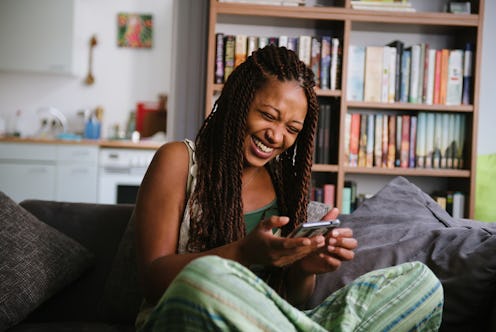Books
This Guide To Being Single Is About Improving Your Life, Not Your Relationships
We might not be living in the Jane Austen era, but there is still a pervasive conviction that any single adult should have a spouse. Never mind that research shows that marriage offers, at best, only a small boost in happiness — the attitude lives on, and it puts very real pressure on anyone who is unattached. For a lot of people out there — women, in particular — it can make being single a very unenjoyable experience at times.
Dr. Jennifer Taitz, a board-certified cognitive behavioral clinical psychologist and certified dialectical behavioral therapist, tackles singledom in her new book, How to Be Single and Happy: Science-Based Strategies for Keeping Your Sanity While Looking for a Soul Mate. If you’re rolling your eyes, you can stop now, because this isn’t a tired or cliché relationship self-help book. Taitz’s latest work is all about living better, which all of us should want to do.
“My goal was really to increase people’s sense of peace and joy, and increase people’s sense that they could have happiness regardless of circumstances that they didn’t necessarily choose,” Taitz tells Bustle. “I really wanted to empower readers because I feel like a lot of books in the dating space, paradoxically, are quite isolating, making people feel more alone or worse.”
How to Be Single and Happy: Science-Based Strategies for Keeping Your Sanity While Looking for a Soul Mate by Jennifer L. Taitz, $13, Amazon
To accomplish her objective, the clinical psychologist explores common habits that can make people miserable. One example is ruminating, which Taitz describes in How to Be Single and Happy as “obsessively dwelling on certain thoughts and symptoms.” You might instead know it as overthinking. It is an all-too-addicting practice, not to mention one that is especially prevalent among women, according to Taitz. In fact, it is part of the reason why the book is geared toward a female audience.
“I wanted to choose depth over breadth and really focus on women,” Taitz says.
Given that she is a woman herself, Taitz felt better equipped to delve into the issues that affect her sex. Those issues include topics like in vitro fertilization and the "games" we’re taught to play to attract a mate, among others. She also highlights the stigma of being single, which she argues is greater for women than for men. Take the example of Jennifer Aniston, for instance. For years, the former Friends star was painted by the media as sad and alone, all while fellow actor George Clooney was hailed as a “confirmed bachelor” — a term that lacks, as Taitz writes, an “acceptable female equivalent.”
Although she doesn’t see the single stigma lessening at present, Taitz is hopeful for the future, especially given the moment we’re in now with the Time’s Up movement and other similarly empowering developments.
“This is kind of a pivotal year, and it will be interesting to see what happens in future years, because I think this is sort of the end of an era,” she tells Bustle.
While How to Be Single and Happy is women-centric, anyone can benefit and find value in Taitz’s work. She offers tools for leaving behind harmful behaviors, as well as exercises to help readers become more mindful. (I kid you not, I learned a method of meditation that so far is helping me sleep better.) On top of that, the book’s two most important takeaways, in Taitz’s opinion, are not even relationship-specific: She wants to encourage readers to be thoughtful and deliberate in how they use their time, and to give back.
“I really am totally personally and professionally obsessed with the practice of behavioral activation, which is creating a full, rich schedule comprised of some things that give you a sense of pleasure and some things a sense of mastery, because we need to enjoy our lives and we need to feel accomplished in our lives,” she says.
At the same time, Taitz emphasizes that “there’s something incredibly life-changing about contributing and giving back, and there are so many ways that we can do so.”
“There’s something incredibly life-changing about contributing and giving back, and there are so many ways that we can do so.”
The value of both of these approaches is supported by scientific research, and they are also central to the way Taitz lives her own life. In fact, she’s donating a percentage of the book’s proceeds to two women’s charities, Distributing Dignity and Girls Not Brides. In addition to continuing to help improve lives, she is “spreading a message beyond the limits of how many people [she] can physically see” as patients. If they happen to find love as a result, well, that’s just a bonus.
